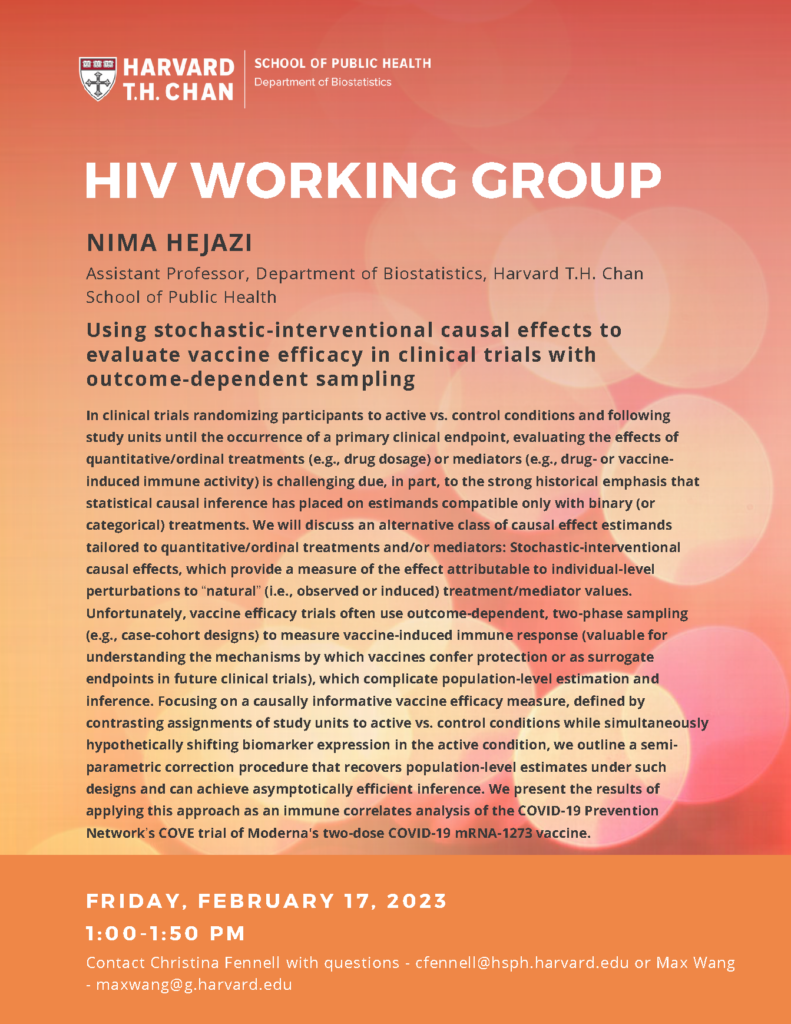
- This event has passed.
HIV Working Group
February 17, 2023 @ 1:00 pm - 1:50 pm

Nima Hejazi, Ph.D.
Assistant Professor, Department of Biostatistics, Harvard T.H. Chan School of Public Health
“Using stochastic interventional causal effects to evaluate vaccine efficacy in clinical trials with outcome dependent sampling”
ABSTRACT: In clinical trials randomizing participants to active vs. control conditions and following study units until the occurrence of a primary clinical endpoint, evaluating the efficacy of quantitative treatments (e.g., drug dosage) or mediators (e.g., drug- or vaccine-induced immune activity) is challenging. This is due, in part, to the fact that statistical innovations in causal inference have historically focused on defining estimands compatible only with binary (or categorical) treatments. We will review a key issue with such approaches, which severely compromises their stability and, consequently, their applicability to real-world data analysis. We will then turn to an alternative class of causal effect estimands based on modified treatment policies (defined by stochastic interventions) and tailored to quantitative treatments and/or mediators. We will introduce stochastic-interventional causal effects, which provide a measure of the effect attributable to perturbing a treatment variable’s “natural” (i.e., observed or induced) value, focusing primarily on how these effect definitions provide a scientifically informative solution when working with quantitative treatment variables. Unfortunately, the estimation of these estimands in vaccine efficacy trials often requires significant additional care, for such trials measure immunologic biomarkers – critical to understanding the mechanisms by which vaccines confer protection or as surrogate endpoints in future clinical trials – via outcome-dependent two-phase sampling (e.g., case-cohort) designs. These biased sampling designs have earned their popularity: they circumvent the administrative burden of collecting potentially expensive biomarker measurements on all study units without limiting opportunities to detect biomarkers mechanistically informative of the disease or infection process. To address this challenge, we outline a semi-parametric correction procedure that recovers population-level estimates (in spite of outcome-dependent, two-phase sampling), with guarantees of asymptotically efficient inference (i.e., minimal variance within a suitable regularity class), of a causally informed vaccine efficacy measure defined by contrasting assignments of study units to active vs. control conditions while simultaneously hypothetically shifting biomarker expression in the active condition. This results in a descriptive causal dose-response analysis informative of next-generation vaccine efficacy and useful for bridging vaccine efficacy from a source pathogen strain (e.g., index SARS-CoV-2 strain at outbreak) to reasonably similar variants of concern (e.g., Delta). We present the results of applying this approach in distinct analyses of two vaccine efficacy trials: (1) the HIV Vaccine Trials Network’s 505 trial of an HIV antibody boost vaccine and (2) the COVID-19 Prevention Network’s COVE trial of Moderna’s two-dose COVID-19 mRNA-1273 vaccine.



